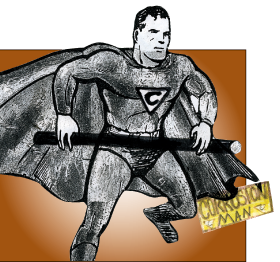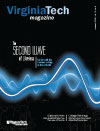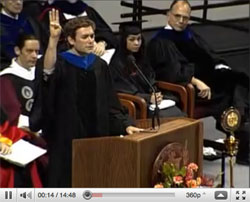 |
|
||||||
|
|
|||||||||||||||||||||||||||||||||||||||||||||||||||||||||||||||||||||||||||||||||||||||||||||||||||||||||||||||||
|
Marc Edwards: Corrosion Man
"This is the greatest job in the world. I get paid to create new knowledge." Marc Edwards paused, as if the idea was still mind-blowing after 14 years at Virginia Tech. On the fourth floor of Durham Hall, he peered around his office and gestured toward campus. "Amazing." Edwards, the Charles P. Lunsford Professor of Civil and Environmental Engineering in the College of Engineering, brings this level of enthusiasm to his research and teaching every day. Edwards' verve has earned him a reputation—he was dubbed "The Plumbing Professor" by Time magazine in 2004 for his work investigating the prevalence of lead in Washington, D.C., drinking water. Because lead had been discovered in water in D.C. homes in the early 2000s, the D.C. Department of Health requested in 2004 that the Centers for Disease Control and Prevention (CDC) help assess the impact on residents' health. In response, the CDC issued a 2004 report in its Morbidity Mortality Weekly Review (MMWR) publication, indicating that elevated lead in drinking water adversely impacts blood lead levels (BLLs) and that lead concentrations must be monitored.The report also states that homes with lead service pipes are older and therefore the residents are "more likely to be exposed to high-dose lead sources (e.g., paint and dust hazards)." Moreover, the 2004 report said that "no children were identified" with BLLs above 10 µg/dl (micrograms of lead per deciliter of blood) "even in homes with the highest water lead levels"—a statement the CDC itself termed "misleading" in a 2010 notice to readers. Reading the statements in 2004, Edwards immediately questioned their validity. He had measured the levels himself in March 2003, when he was working on a pinhole leak in a private home. Lead in water is considered unsafe at 15 parts per billion (ppb), but the readings were so high that his handheld meter, whose scale reached 1,250 ppb, wouldn't register the level. Knowing lead contamination inside and out, Edwards thought the 2004 CDC findings were impossible, and he started to investigate. From discussions with residents and as the result of congressional subpoenas, Edwards knew that the residents tested by the CDC had been informed months to a year in advance that they should avoid tap water and drink bottled or filtered water. In Edwards' assessment, the report nonetheless implied that residents drinking tap water were not at a greater risk of lead exposure. The report was deliberately misleading, Edwards said. In a statement this June, CDC spokesperson Bernadette Burden said that the report may have been "confusing," but the language wasn't deliberate misleading. She pointed to the CDC's 2010 notice to readers that explained that the 2004 report also should have referenced a separate study showing that children living in homes serviced by lead pipes were more than twice as likely to have elevated BLLs. Burden also noted a 2004 cross-sectional study of 201 residents in which 76 percent of respondents reported using tap water and 53 percent reported using a water filter. In 2004, with anger and resignation, Edwards decided to challenge the CDC's initial report. When most people might have given up, he just pushed harder, spending his own time and money on the research and putting his professional reputation on the line.
Edwards' research continued through the mid-2000s. The tide started to turn in 2007, when he was awarded a MacArthur Fellowship, often called a "Genius Grant," a no-strings-attached $500,000 grant to further his research. In 2008, a breakthrough finally came: The Children's National Medical Center in D.C. shared its data, giving Edwards access to the levels of lead in D.C. children. When Edwards finished analyzing the numbers, a clear correlation between the high lead levels in water and the children's health problems emerged. Hundreds and probably thousands of children had suffered irreversible damage as a result of the lead poisoning. Edwards testified at congressional hearings critical of the CDC, and his paper on the subject won the Environmental Science and Technology journal's Editor's Choice Award for Best Science Paper of 2009. While Edwards won this round of his monumental battle, he does not want the lead crisis to define him. "I try not to talk about it much," he said. "I have other positive goals for my career and advisee research." His research now involves studying harmful bacteria in water heaters in private homes and pinhole leaks in pipes. He is also examining how water at a house closer to a treatment plant differs from water at points farther along the pipes. After his battle with the CDC, he also found his research heading in an unexpected new direction. He won a Praxis Award in Professional Ethics in 2010 from Villanova University, and he teamed with D.C. resident Yanna Lambrinidou, who had assisted him in the fight against the CDC, on a proposal to the National Science Foundation to study research ethics. He called the field of ethics and scientific misconduct an interesting new world. "We as scientists have never gotten a handle on this," Edwards said. "How do we teach students about the cost of scientific misconduct to society?" In fall 2010, he and Lambrinidou co-taught a graduate ethics class using role-playing to help students understand the real-world pressures that can cause scientific misconduct. "The students who took the class had their lives changed. We helped students realize how easy it is to tell a half-truth that eventually turns into a great big lie," Edwards said. Having administered about a million dollars in research per year for the past nine years, Edwards said he misses teaching such courses as Introduction to Environmental Engineering, an undergraduate class that allowed him to cover current topics including global warming and ozone depletion. The class provided a showcase for environmental engineering and helped to identify motivated students for his research assistantships. He said the assistantships allow him to teach the best way possible: hands-on. "I don't do research without student involvement, and it's a two-way street. I learn a lot from my students, but it's also an apprenticeship where they learn by doing," he explained. He encourages his students to listen to everyday people experiencing a problem in order to design experiments to reproduce what people have seen. Edwards compares research on plumbing failures to studying lightning strikes. "You learn more from one unusual event described to you by a consumer than from a million usual ones studied in a lab." Edwards' practical teaching style must be paying off. Approximately half of his research interns have won some form of national recognition for their work, and students regularly praise Edwards as inspirational. Paul Mueller, a civil engineering major who will be a senior this fall, described hearing one of Edwards' undergraduate seminars: "I spent class looking at the clock seeing how much more time we got to have, not how long until we got out. I don't remember the last time I was that attentive." Edwards has a way of captivating his students because he believes in his work and he believes in them. "When Tech students follow their hearts, there is no limit to what they can accomplish." Considering his quest to protect D.C. residents, Edwards is proof that the same can be said of Tech faculty members. Senior English major Hillary May is an intern with Virginia Tech Magazine. Jesse Tuel and Denise Young contributed to this article.
|
|
||||||||||||||||||||||||||||||||||||||||||||||||||||||||||||||||||||||||||||||||||||||||||||||||||||||||||||||||
|
|




